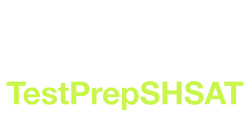HOW TO CHOOSE AN SHSAT TUTOR 2020
Part 1: What should you pay for a 3-month SHSAT test prep program?
The history of SHSAT test prep is quirky and fragmented, with course prices ranging from free to nearly $5,000 for a summer camp program. These extremes can leave NYC parents less informed about what prices they should be paying for SHSAT prep. In part 1 of our series, How to Choose an SHSAT Tutor 2020, we will compare SHSAT prep to analogous college admissions prep where the market is larger, less fragmented, and priced more competitively to assess what NYC parents should be paying for their SHSAT prep.
Let’s start with an analogous SAT prep program: one that mirrors the largest SHSAT prep programs. An obvious choice for comparison is Princeton Review’s SAT 1400+ program. Princeton Review is arguably the largest private SAT prep firm with over 20 years experience. Much like the larger, private SHSAT programs, the Princeton Review program prequalifies higher scoring candidates, provides a 3-month training program, and promises high scores—arguably similar to those exceeding the specialized high school cut-off levels. The advertised SAT prep cost: $1,374. Compare this to one large SHSAT prep provider also with 20 years experience that prequalifies candidates, provides a summer camp program, and promises a high success rate. The advertised SHSAT prep cost: $3,900-4,600. The contrast in price between similar programs provided by experienced firms is stark. It suggests NYC parents frequently overpay by about $3,000 for many well-known seasonal SHSAT test prep programs. Let’s investigate the matter more closely.
Why is a high school admissions test prep program three times the cost of a similar college admission program? Is specialized high school admission fundamentally more important than college admission? Certainly not. Even a specialized high school, in most parents’ mindset, is a stepping stone to a better, more prestigious university. Harvard is a greater prize than Stuyvesant! Is SHSAT prep fundamentally harder or more time consuming than college admissions? No. Both tests cover math and verbal topics for a three-hour exam. The material is more advanced for college admissions, and the SAT includes an optional essay exam not included in the SHSAT. However, adjusted for age, the two exams arguably provide similar challenges. Maybe extra time and effort to get a near perfect score is more important for the SHSAT? Perhaps that justifies extra SHSAT hours and overall expenditures. In fact, the opposite is true. A perfect score is important for the SAT, but not at all for the SHSAT. SHSAT admission only requires a score above a cut-off. Anything higher does not benefit a student. On the other hand, all the extra hours an SAT student devotes to raise his/her score from 85% to 90% to 95% to perfection will make a significant difference in college admission.
In summary, SHSAT test prep is no more demanding than SAT prep. A high exam score is not a greater prize for the SHSAT, and there are reasons to train harder and longer—spending more dollars all the while—for the benefit of incremental SAT score improvements. Based on the nature of the test, it appears that many parents in the smaller, more fragmented SHSAT test prep market are overpaying by as much as $3,000 for seasonal courses that commit their students to double the hours required by similar college admission courses. In part 2, we will look more closely at where all those extra billable SHSAT training hours are going.
HOW TO CHOOSE AN SHSAT TUTOR 2020
 Part 2: Does that high priced seasonal SHSAT camp provide an A+ SHSAT curriculum?
Part 2: Does that high priced seasonal SHSAT camp provide an A+ SHSAT curriculum?
In part 1 of this series, we compared large, experienced SHSAT test prep programs to comparable, competitive SAT test programs and concluded that the advertised price of these large SHSAT test prep programs is arguably more than three times the “fair” price. We also noted that the SHSAT seasonal programs commit young students to considerably more curriculum hours than similar SAT prep. In this second part of How to Choose an SHSAT Tutor 2020, we will focus on the quantity and quality of curriculum hours.
Is it possible that SHSAT prep requires more time than SAT prep, and the higher overall cost of SHSAT programs reflects a higher total required time commitment at a similar hourly rate…over three times the total hours? As discussed in part 1, the answer appears to be, “No.” The body of students in each program is screened to include only high performing candidates who have proven to have a relatively strong starting knowledge of the subject material. The exam requirements for the SHSAT are no broader or more difficult than the SAT, after which the new SHSAT is modeled. Both standardized exams test similar subjects in similar ways, age adjusted, for about three hours, a similar testing time. If anything, part 1 indicated there is an incentive for SAT students to study more because they do not have to merely meet a cut-off. SAT students benefit from additional hard earned gains as SAT scores approach perfection. The vast difference in advertised course hours can be better understood by digging a little deeper, beyond the cover details.
First, the comparison of the SAT 1400+ program’s 36 hours over 3 months is not an apples to apples comparison to the 104-hour SHSAT summer camp program. The Princeton Review SAT course properly does not list the hours for practice exams and similar periods where the students are not actively learning from instructors. Why should you pay nearly $40 per hour for the time your student takes a practice test or is otherwise taking a break from instruction? The SHSAT program does not deduct for practice test hours and expected breaks within 4 hour class periods. Those non-training hours amount to 20 hours for the SAT program. If included, the SAT program would be 56 hours, which suggests 20/56 or 36% of the SHSAT course curriculum includes non-training hours. A similar deduction from the billable SHSAT curriculum hours would put the SHSAT course at 67 hours–closer but still a significant gap from 36 hours.
However, much of this gap disappears when accounting for the absurd amount of hours devoted to one topic in the SHSAT summer camp curriculum. The large, experienced SHSAT summer camp program includes six 4-hour classes totalling 24 hours of curriculum devoted to grammar. The standalone edit-revise section of the SHSAT, which tests grammar, only amounts to 3 or 4 questions on the SHSAT. There are 114 questions in all. That means nearly one-quarter of the pricey SHSAT course is devoted to less than 3% of the test. Why would any respectable educator, let alone a program that outwardly markets its experience, include these hours in the curriculum? It is impossible for this time investment in the edit-revise standalone exam section to make any significant difference to student results. Unfortunately, most parents think they have signed up for an A+ curriculum and have no idea they paid for wasteful curriculum hours. A further reduction of nearly 20 non-essential hours from the SHSAT summer camp curriculum moves the justified SHSAT course total to almost 47 hours, a number in the same ballpark as the SAT 1400+ program. Who knows what other extra hours have been included in the large SHSAT summer program?
In conclusion, it appears both the large experienced SHSAT test prep provider and the SAT prep program are charging nearly $40 per hour for group classes, but the SHSAT test prep provider is substantially inflating the curriculum hours. The indicated curriculum hours for the SHSAT course does not deduct for time taking practice exams and other periods where students are not actively learning. Moreover, the SHSAT program includes nearly one-quarter of curriculum hours to a part of the SHSAT that represents only 3% of the exam, a clear indication of a poorly designed curriculum or at least one advertised to maximize sales to parents who may not fully understand what they are paying for. While we are not suggesting students will enter these programs and fail to be trained for the SHSAT, the second part of this series confirms that parents are overpaying for large seasonal SHSAT test prep programs in part because the hours of curriculum are inflated. An apples to apples comparison of curriculum hours suggests parents of these large SHSAT programs are effectively paying $100 per hour for group classes, a number that exceeds some one on one tutoring alternatives. In part 3 of this series, we will discuss what options parents have for SHSAT test prep in 2020.

